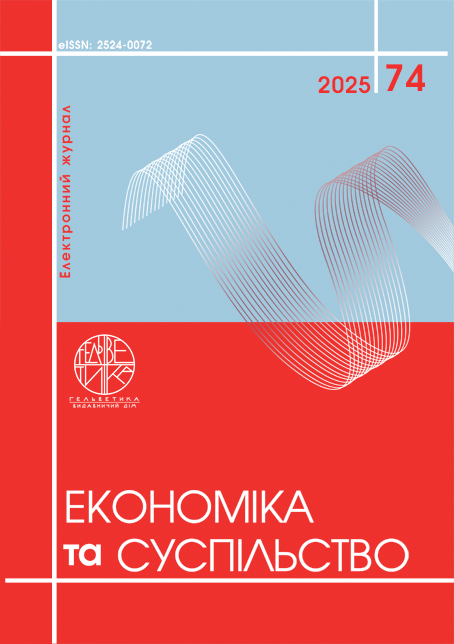THE ROLE OF INTERNATIONAL FINANCIAL INSTITUTIONS IN SHAPING THE ECONOMIC RESILIENCE OF WARTIME COUNTRIES: THE CASE OF UKRAINE IN A COMPARATIVE CONTEXT
Abstract
This article critically examines the evolving role of international financial institutions (IFIs)—specifically the International Monetary Fund (IMF), World Bank, and European Bank for Reconstruction and Development (EBRD)—in safeguarding macroeconomic stability and fostering institutional resilience within war-affected economies. Focusing on Ukraine as a paradigmatic case, the study investigates the transformation of IFI operational mandates in response to Russia’s full-scale military aggression initiated in 2022. Ukraine’s unprecedented access to an IMF Extended Fund Facility (EFF) amid active warfare not only underscores a paradigmatic shift in crisis engagement frameworks but also signals the institutional reconfiguration of global financial governance. Employing an interdisciplinary methodology—integrating comparative political economy, institutional theory, and structural-functional systems analysis—the paper juxtaposes Ukraine’s fiscal trajectory with post-conflict reconstructions in Syria and Sudan. It introduces the analytical construct of “institutional economic resilience” to conceptualize the adaptive capacities of state and supranational financial architectures under extreme geopolitical stress. Furthermore, a novel Adaptability Index is proposed to assess the responsiveness of IFIs in recalibrating instruments, conditionalities, and support modalities during prolonged emergencies. The findings reveal a redefinition of IFI mandates—from conventional fiscal surveillance to active facilitation of anti-corruption reforms, judicial integrity, and public sector modernization. Drawing upon recent IMF and World Bank datasets, the article delineates forward-looking recovery scenarios for Ukraine (2025–2027), emphasizing debt sustainability, private-sector reactivation, and the catalytic role of multilateral financing. Ultimately, this study contributes to the field of conflict economics and international development by articulating a new framework for IFI engagement in fragile and conflict-affected states. Its insights are of particular relevance to scholars, financial architects, and policymakers confronting the challenges of post-war economic stabilization and institutional renewal.
References
Іванов С.О. Міжнародні фінансові інституції у воєнних конфліктах: теоретичний аспект. — Київ: Економічна думка, 2021. — 214 с.
Петрова Н.В., Кузнєцов М.А. Роль Світового банку в економічному відновленні країн після конфліктів. // Журнал міжнародної економіки. — 2022. — Вип. 3. — С. 45–67.
Smith J., Johnson R. The European Bank for Reconstruction and Development and post-conflict economic stabilization: a comparative study. // Journal of International Finance. — 2020. — Vol. 15, No. 2. — P. 123–147.
Chen L., Ahmed R., Hassan M. Adaptive models of international financial institutions in conflict zones: The Syrian case. // Global Economic Review. — 2023. — Vol. 52, No. 4. — P. 334–358.
Коваленко І.М. Особливості співпраці України з МВФ в умовах війни. // Вісник економічної безпеки. — 2023. — № 1. — С. 12–29.
Сидоренко В.П. Оцінка ефективності програм МВФ у кризових ситуаціях. // Економіка та управління. — 2022. — № 7. — С. 78–95.
Бушінський Б.Х. Економічна стійкість у контексті воєнних конфліктів: теоретичний аналіз // Економіка України. – 2021. – № 5. – С. 45–58.
Ostrom E. Adaptive governance and institutional resilience: Frameworks for managing uncertainty // Global Environmental Change. – 2009. – Vol. 19, № 4. – P. 412–437.
International Monetary Fund. Rapid Financing Instrument (RFI) Manual // IMF Publications. – 2022. – P. 7–12.
International Monetary Fund. Extended Fund Facility: Guidelines and Case Studies // IMF Reports. – 2023. – P. 23–35.
World Bank. Policy-Based Lending and ESG Integration in Post-Conflict Recovery // World Bank Reports. – 2024. – P. 112–125.
IMF. Ukraine: Rapid Financing Instrument – Report and Disbursement Data. IMF Country Report No. 22/123. 2022. – С. 10–18.
IMF. Ukraine: Extended Fund Facility Arrangement Review. IMF Country Report No. 23/45. 2023. – С. 22–40.
World Bank. Sudan Economic Update: Challenges after the 2021 Military Coup. World Bank Report. 2023. – С. 55–67.
UN OCHA. Syria Humanitarian Response Plan 2023. United Nations Office for the Coordination of Humanitarian Affairs. 2023. – С. 102–115.
Ivanov, S. O. (2021). Mizhnarodni finansovi instytutsii u voiennykh konfliktakh: teoretychnyi aspekt [International financial institutions in armed conflicts: Theoretical aspect]. Kyiv: Ekonomichna dumka. — 214 с.
Petrova, N. V., & Kuznietsov, M. A. (2022). Rol Svitovoho banku v ekonomichnomu vidnovlenni krain pislia konfliktiv [The role of the World Bank in the economic recovery of post-conflict countries]. Zhurnal mizhnarodnoi ekonomiky – Journal of International Economics, (3), 45–67.
Smith, J., & Johnson, R. (2020). The European Bank for Reconstruction and Development and post-conflict economic stabilization: A comparative study. Journal of International Finance, 15(2), 123–147.
Chen, L., Ahmed, R., & Hassan, M. (2023). Adaptive models of international financial institutions in conflict zones: The Syrian case. Global Economic Review, 52(4), 334–358.
Kovalenko, I. M. (2023). Osoblyvosti spivpratsi Ukrainy z MVF v umovakh viiny [Peculiarities of Ukraine’s cooperation with the IMF during wartime]. Visnyk ekonomichnoi bezpeky – Bulletin of Economic Security, (1), 12–29.
Sydorenko, V. P. (2022). Otsinka efektyvnosti prohram MVF u kryzovykh sytuatsiiakh [Evaluation of IMF program effectiveness in crisis situations]. Ekonomika ta upravlinnia – Economics and Management, (7), 78–95.
Bushynskyi, B. Kh. (2021). Ekonomichna stiikist u konteksti voiennykh konfliktiv: teoretychnyi analiz [Economic resilience in the context of military conflicts: A theoretical analysis]. Ekonomika Ukrainy – Economy of Ukraine, (5), 45–58.
Ostrom, E. (2009). Adaptive governance and institutional resilience: Frameworks for managing uncertainty. Global Environmental Change, 19(4), 412–437. https://doi.org/10.1016/j.gloenvcha.2009.06.001
International Monetary Fund. (2022). Rapid Financing Instrument (RFI) Manual. IMF Publications, 7–12.
International Monetary Fund. (2023). Extended Fund Facility: Guidelines and Case Studies. IMF Reports, 23–35.
World Bank. (2024). Policy-Based Lending and ESG Integration in Post-Conflict Recovery. World Bank Reports, 112–125.
International Monetary Fund. (2022). Ukraine: Rapid Financing Instrument – Report and Disbursement Data (IMF Country Report No. 22/123), 10–18.
International Monetary Fund. (2023). Ukraine: Extended Fund Facility Arrangement Review (IMF Country Report No. 23/45), 22–40.
World Bank. (2023). Sudan Economic Update: Challenges After the 2021 Military Coup. World Bank Report, 55–67.
United Nations Office for the Coordination of Humanitarian Affairs. (2023). Syria Humanitarian Response Plan 2023, 102–115.

This work is licensed under a Creative Commons Attribution 4.0 International License.


